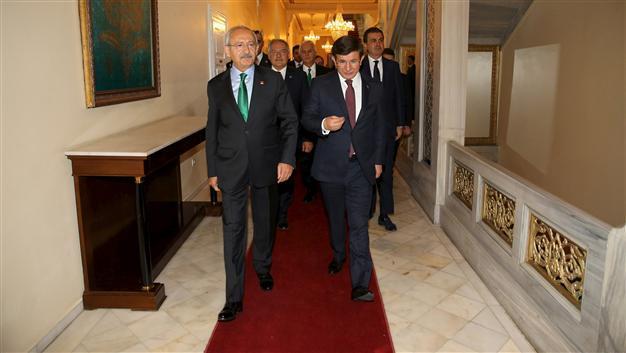Elections on horizon in Turkey as AKP-CHP talks fail
ANKARA

Turkey's Prime Minister Ahmet Davutoğlu (R) and main opposition Republican People's Party (CHP) leader Kemal Kılıçdaroğlu (L) arrive their meeting as part of the coalition talks in Ankara, Turkey, August 13, 2015. Prime Minister's Press Office/Handout
Coalition talks between the Justice and Development Party (AKP) and Republican People’s Party (CHP) ended in failure on Aug. 13, with the AKP leader admitting their counterpart had refused their proposal to form a short-term coalition government to bring Turkey to an early election.“A conviction which states there is no ground to make a government partnership at this stage has been reached,” Prime Minister Ahmet Davutoğlu, the head of the AKP, told reporters at a press conference following a 1.5-hour meeting with CHP leader Kemal Kılıçdaroğlu.
“There is a strong possibility of appealing to the national will,” he said in reference to new snap polls, following the inconclusive June 7 elections.
“The two parties, which have different backgrounds, have had deep differences of views besides agreeing on certain matters,” Davutoğlu said, citing education and foreign policy issues as the main topics where the two sides failed to come together.
Referring to his meeting with Kılıçdaroğlu held on Aug. 10, Davutoğlu said his party had taken this “deep difference of views” and potential problems these differences might create in a coalition government into consideration and offered “other options.”
The AKP offered to form “a transitory reform government” which would work in line with the idea of an early election, Davutoğlu said.
Recalling that both he and Kılıçdaroğlu had gathered with their party’s Central Executive Boards (MYK) following their meeting on Aug. 10, Davutoğlu said the CHP eventually refused the AKP’s proposal, as the party preferred participating in a long-term reform government.
As he mentioned the prospects for an early election, Davutoğlu particularly referred to similar prospects voiced by Nationalist Movement Party (MHP) leader Devlet Bahçeli and noted that he preferred that parliament make a decision for a possible early election instead of the president’s use of his constitutional authority for the early election.
Davutoğlu said he was planning to hold a meeting with Bahçeli and added: “I prefer an early election to be held in the shortest time.”
The prime minister assured people that an early election would be in favor of the stability of the country and would not lead to any kind of uncertainty, including in the economy.
“Holding an early election is not a disaster scenario. Nobody should get stressed with things such as an ‘early election will make Turkey lose one year, five years.’ An election is like being vaccinated. When you are vaccinated, sometimes, you may feel a little sting at a time when you don’t want to. However, vaccination gets the body healthier. There is no need to be afraid of a vaccination. And if you are going to be vaccinated, then there is a need to not stretch it out,” Davutoğlu said.
Historic opportunity missed
The Aug. 10 meeting had already revealed the biggest bone of contention between the AKP and CHP was the tenure and model of any potential coalition partnership. Refuting the AKP’s hope for a short-term minority government to lead to fresh elections, the CHP had been eager for a coalition model which would resolve Turkey’s “chronic problems.” It wanted such a government to be in power for a full four years, until the next parliamentary elections.
“Turkey missed a historic opportunity today,” Kılıçdaroğlu told reporters after the meeting. “This should have been tried.”
Kılıçdaroğlu said Davutoğlu made two proposals to the CHP but neither of them was about forming a genuine coalition government. “We never heard a proposal about forming a coalition government. What we were proposed was to form an election government. [They proposed] a government with a certain agenda that will take the country to elections,” he said.
Criticizing the AKP for not respecting the results of the June polls, Kılıçdaroğlu said: “They always talk about the national will. If you respect the national will, you should have listened to its message in the elections. The message was clear: form a coalition government.”
Recalling that the CHP proposed to establish a high-profile government with a four-year mandate to resolve the country’s fundamental issues, Kılıçdaroğlu said he did not regard early elections as the only option. “Twenty-four hours is a very long time in politics.”
As talks with the CHP failed, Davutoğlu should return the mandate to President Recep Tayyip Erdoğan, he said. “The mandate should be given to the leader of the second biggest party,” he said.
Kılıçdaroğlu also implied Erdoğan’s role in the failure of the coalition talks but preferred not to detail it.
The CHP leader described the preliminary talks with the AKP as intellectual, genuine and civilized and thanked their counterparts for their sincere contributions to the talks.
If an early election is called, it would likely be held around mid-November, around 90 days after the provision of the mandate to form a government.
Nonetheless, the Supreme Election Board (YSK) has the legal authority to schedule the date of the election at an earlier time.
















